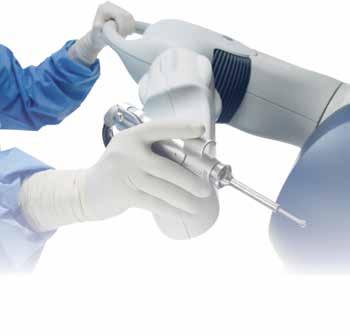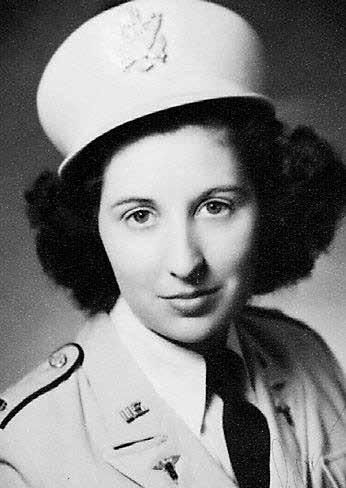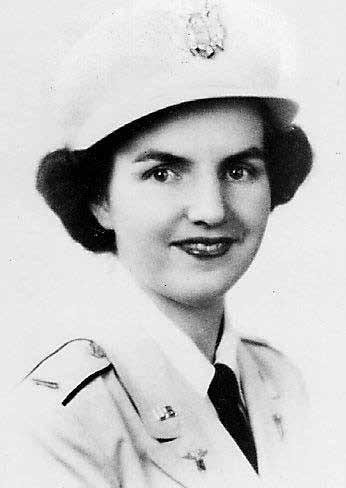
3 minute read
TRANSFORMINGJOINT REPLACEMENT WITH MAKO ROBOTIC ARM ASSISTED TECHNOLOGY
Wh en yo ur joi nt sw ear ou ta nd need re pl ac em en t, co nsi der an inno va ti ve ap pr oach. La ke wa lk Su rg ery Ce nt er no w of fe rs join tr eplac em en tu ti lizing Ma ko Sm artr obo tic s™ te ch nolo gy– en abl in gy ou to ha ve am or ep er sona liz ed and pr ec ise su rg ic al ex perienc e. Ta lk to yo ur sur ge on to see if Ma ko is th er igh to pt ion fo ry ou .

Donahue remembers scrubbing furiously as her unit prepared for inspections by Gen. Eisenhower or Gen. Patton. While working, the nurses usually wore their shirt-and-pants fatigues outfits. But not on Christmas.
"The (wounded) GIs always wanted the nurses to dress in our dress uniforms Christmas Day. They wanted us in dresses,''
Donahue recalled. "And it was cold over there. Well, we did that for them. Boy, I've never forgotten how they enjoyed it. That was more important to me than being cold.
"We probably had long johns on underneath,'' she said, prompting laughter from the group. "But we dressed for them because that was what they wanted.''
A caring voice
As the Allies neared victory in Europe, Rosemary Olson of Duluth's Woodland neighborhood was leaving the United States on a converted luxury liner. Olson had joined the Red Cross and been assigned as a secretary for hospitals in Italy. But, in her words, she "got in late.''

On May 7, 1945, when word came that Germany had surrendered, ending the war in Europe, Olson's ship was in the middle of the Atlantic.
"We wondered if they'd turn around and take us back home,'' Olson said, smiling. "They didn't.''
Olson remembers reading letters from home to patients whose arms had been amputated.
"When they think they may be on their deathbed or (wonder) will they ever get home again, they say different things,'' Olson said. "You do the best to make them feel they're hearing what they want to hear. You read it so it comes out easier.''
History in the making
As victory in Europe let the Allies focus on Japan, Ilene Pearson of Woodland was in Hawaii working as a typist for a Navy unit that processed film from spy planes. Pearson didn't know how close she was to history when, during a bus trip to a picnic, a sergeant made a sly comment.

"I put two little pinpoints on a map today,'' he said. Where, Pearson asked. The sergeant laughed and said he couldn't say.
"But you know where it was,'' Pearson said. "Hiroshima and Nagasaki.''
Two weeks later, a B-29 bomber bound for the first of those cities took off from Tinian Island, north of Guam. Jean Wicker of Lakeside was on the island, using limited resources to plan meals for a field hospital that served troops preparing to invade Japan.
After the two atomic bombings and Japan's surrender in August 1945, the Army dietitian was stationed just 85 miles from Nagasaki to support occupying forces.
The pins on Elizabeth Donahue's American Legion cap depict the Duluthian's experiences in World War II. The ribbon with three stars represents that she served in the European Theater or front. The staff with wings is the Army medical insignia; the "N" means Donahue was a nurse. And the bar means she reached the rank of first lieutenant. The cap is from the former American Legion Women's Post 590, which met in downtown Duluth but disbanded four years ago for lack of active members. Donahue and other members joined American Legion Post 71 in West Duluth. (News Tribune, 1997)
Time brings respect
By 1952, when Faye Thiel went to Japan, the island nation was not a menace, but a docile ally serving as a base for U.S. operations during the Korean War. The Cloquet woman was an Army sergeant for personnel administration and special services, which included arranging transportation for entertainers.
The other thing that had changed, she said, was the moral climate. World War II had clear villains, a clear purpose and an unambiguous outcome. Korea and Vietnam didn't, Thiel said.










